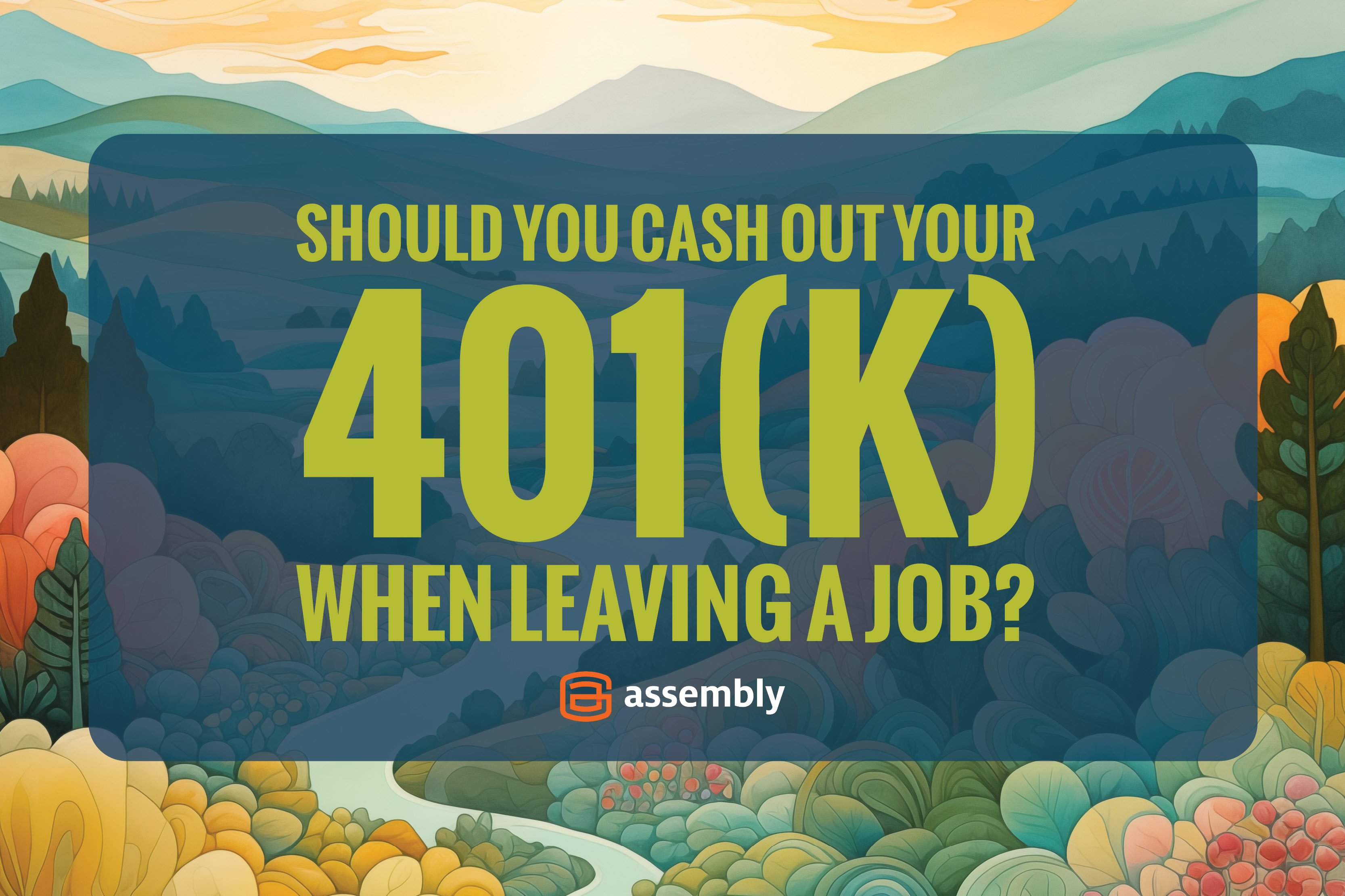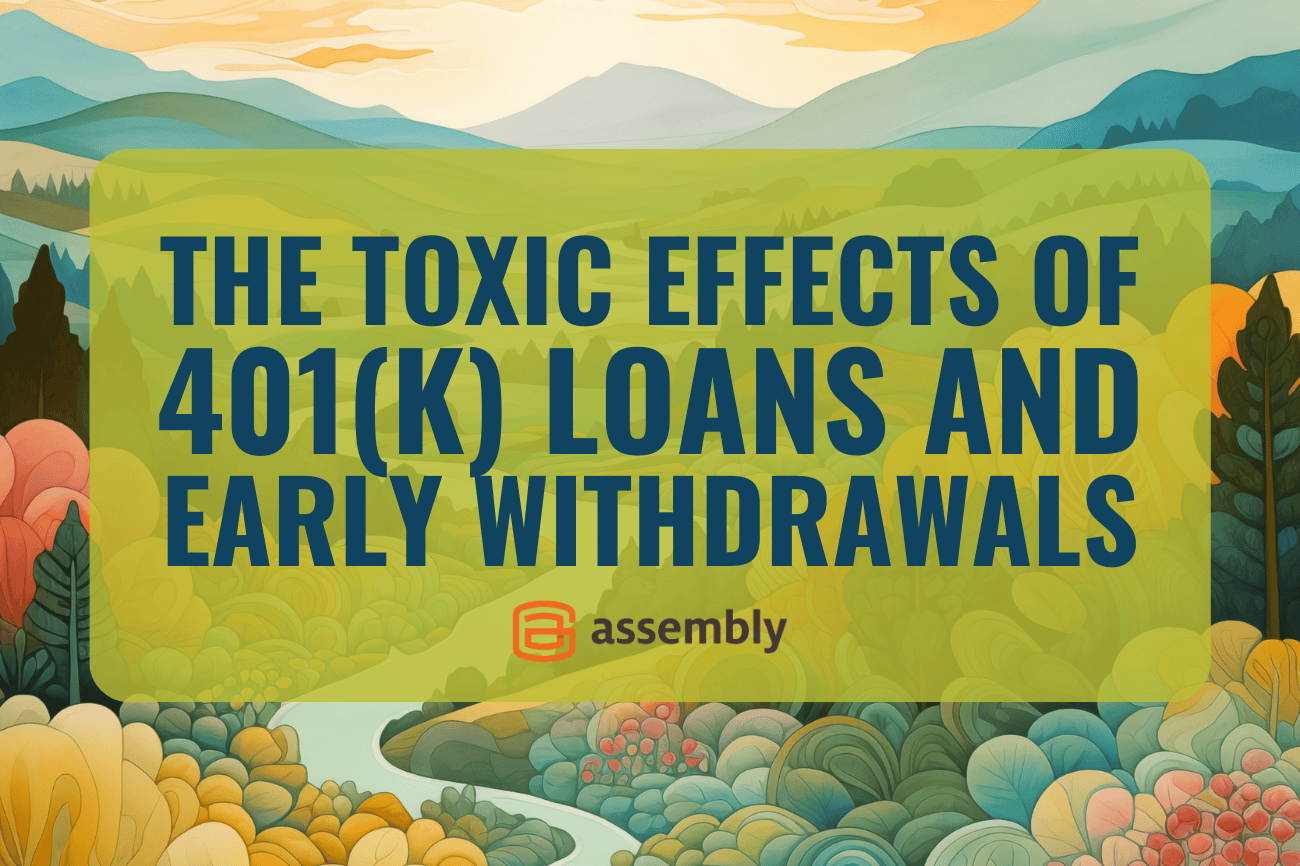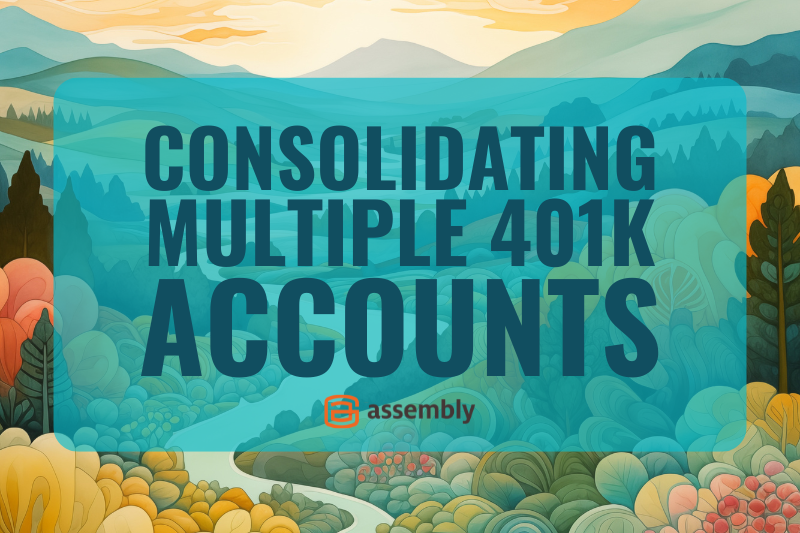The Toxic Effects of 401(k) Loans and Early Withdrawals
Unexpected illness, an emergency home repair, or job loss can create financial turmoil. In the midst of a crisis, withdrawing money from your 401(k)...
5 min read
 Doug Hutchinson
:
Updated on June 21, 2024
Doug Hutchinson
:
Updated on June 21, 2024

When you leave a job — to retire, pursue other opportunities, or due to termination — you’ll have the option to cash out your 401(k). Receiving a big chunk of cash can seem very appealing, especially if your job change was unplanned, but there are other options.
Here are some important things to consider before cashing out 401(k), 403(b) or other retirement savings.
As the saying goes: the best time to start saving for retirement is when you’re young; the second best time is today. Unfortunately, some people treat their retirement savings like a severance bonus and cash out after leaving an employer.
According to a study by The Harvard Business Review, 41% of U.S. workers withdraw some or all of their retirement savings when leaving a job – even though 72% left voluntarily (vs. being fired or laid off). Researchers noted workers were more likely to cash out when their account had a high percentage of money contributed by their employer. The authors surmised employees who cashed out may have considered their retirement savings “house money” or “free money.”
This is flawed thinking because:
If you withdraw money from your 401(k) after leaving a job and you’re not at least 59½ years old, you’ll pay a 10% penalty. Additionally, the amount of the withdrawal is subject to federal income tax. If you live in a state or county with an income tax, they’ll also take a cut. Also, a significant withdrawal can push you into a higher tax bracket, making the tax bite of the withdrawal even more painful.
Pay Now and Pay Later If You Withdraw Before Age 59½
Let’s say you’re 40 years old, have $50,000 in your 401(k) and live in California. If you cash out, you could receive somewhere around $38,000 after paying taxes and the 10% penalty. Here’s the breakdown:
401(k) Retirement Savings = $50,000
Final Payout = $38,000.
The above is a hypothetical but realistic estimation to illustrate the true cost of withdrawing money from your 401(k) early. But it gets worse…
Cashing out a 401(k) when you’re mid-career means losing out on potential growth. A $50,000 401(k) could turn into $159,411 after 20 years (based on an average 7%* annualized return).
* The S&P’s average, annualized return has been 7.58% since 1971 and 7.9% in the past 30 years. Past performance does not guarantee future results.
If you’re leaving your job to retire early, it’s still a good idea to hold off on cashing out. Most retirees end up in a lower tax bracket.
A recent survey of adults in the U.S. found: 74% are confident they’ll be able to retire by age 64, but only 41% have retirement savings. The findings aren’t contradictory per se, but it makes you wonder how the folks without retirement savings will achieve their retirement goals. In case you’re wondering, the survey included Boomers, Gen X and Millennials. The results were not skewed by the optimism of youth.
Whether you plan to retire early or simply hope to retire comfortably, most workers benefit from keeping their money invested. Here are some of the best alternatives to cashing out your 401(k).
A high percentage of employers allow former employees to keep their account. It’s the easiest alternative to cashing out, and there are many advantages including:
There are, however, some potential disadvantages. Your former employer may change custodians down the road and you’ll have to create a new account and choose new funds anyway. Or, the funds in your existing plan may no longer be a good fit for your investment goals. The best move is to consult a financial advisor.
Leaving a job can be an excellent opportunity for financial spring cleaning. A consultation with a wealth manager can help you confidently decide whether to keep your current investments or roll them into a new account.
If you don’t plan to open a 401(k) with a new employer or simply want total control over your investments, an IRA (individual retirement account) is a good option. You can roll over your existing 401(k) “in-kind,” which means transferring assets without selling them.
The process is easy, especially if you already have a brokerage or retirement account with Fidelity, Schwab, etc. If you don’t have an existing account, most firms allow you to open a Rollover IRA account by filling out an online application.
Leaving or losing your job can be a hectic and uncertain time. An Assembly Wealth representative can recommend investment options and even set up your Rollover IRA account.
What about a Roth IRA?
Unless you’re rolling over a Roth 401(k), you’ll pay taxes on whatever you deposit in a Roth IRA. For investors who haven’t reached their peak earning years, this may make sense because money in a Roth account grows tax-free. Put another way: if you expect your tax rate will be considerably higher in the future, ask your financial advisor if converting your 401(k) into a Roth might be a smart move.
If you’re moving to a new employer that offers a 401(k) plan, you may be able to rollover your existing 401(k) into a new 401(k). By consolidating retirement plans, you’ll have fewer accounts to keep track of and you won’t have to pay a penalty or income tax on any funds you transfer over.
That said, the new plan may not have investment options that suit your needs. Before starting the rollover process, contact a financial advisor. If you decide to move forward, our wealth managers can do all the paperwork and back-and-forth communication required to complete your rollover.
This is a tough question to answer without knowing the type of debt, interest rate and other assets. For example, if you have a Roth IRA or Roth 401(k), any money deposited more than five years ago can be withdrawn tax-free and without penalty. The best thing to do is contact a financial professional who can make recommendations based on your specific situation.
Some retirement plans allow hardship distributions. For example, if you need money to pay for certain medical expenses or to avoid foreclosure on your principal residence — you can withdraw money without paying the 10% penalty. You will, however, pay taxes on the withdrawal.
The SECURE 2.0 Act (Section 115) allows penalty-free emergency distributions of up to $1,000 per year from a 401(k), 403(b) or 457(b) account. The fund must:
A change in employment can be scary, but it’s also a good time to evaluate where you are versus where you want to be. The friendly and experienced team at Assembly Wealth can help you:
Even if you’re not retiring or switching jobs, our wealth managers can help evaluate your current investment allocations and make recommendations based on your short-term needs and long-term goals. In our view, financial planning isn’t one-size-fits-all. We’ll take the time to get to know you and where you want your financial plan to take you before offering advice.
Disclaimer: Assembly is neither an attorney nor an accountant, and no portion of this content should be interpreted as legal, accounting or tax advice. Individuals should consult with an investment professional, or an attorney or tax professional regarding their specific investment, legal or tax situation.
Related Reading:
Fill out the form to be notified about new articles.

Unexpected illness, an emergency home repair, or job loss can create financial turmoil. In the midst of a crisis, withdrawing money from your 401(k)...

As we age, we accumulate things: workout equipment, kitchen gadgets and 401(k) accounts from different jobs. The workout equipment and gadgets may be...

About 40% of U.S. workers will lose their job at some point in their career. Being laid off can leave you feeling rejected, sad, or even angry — even...